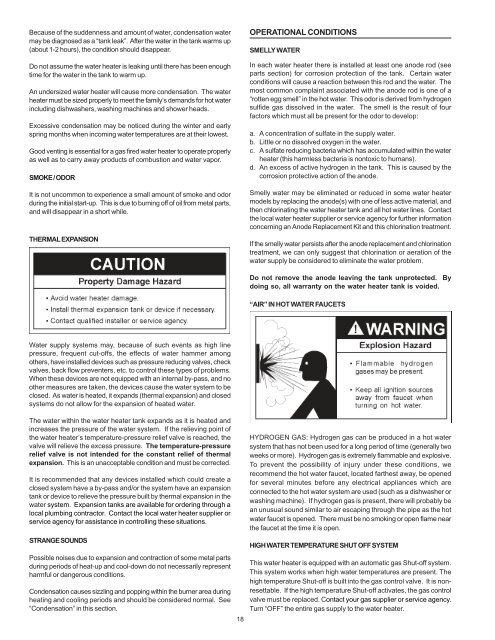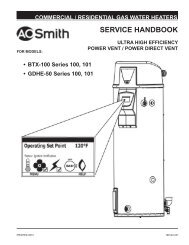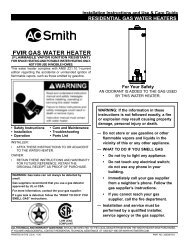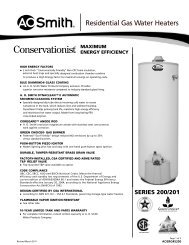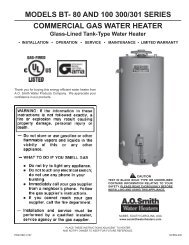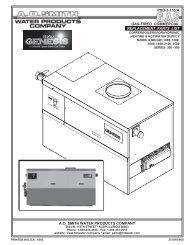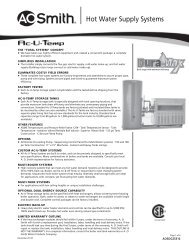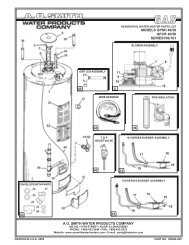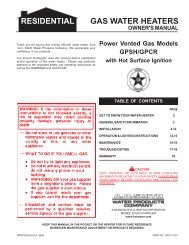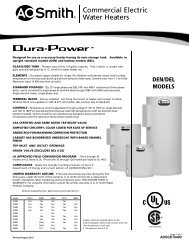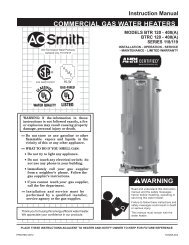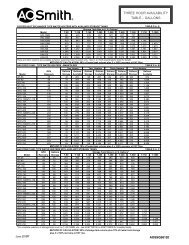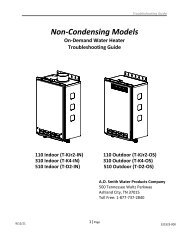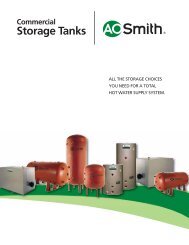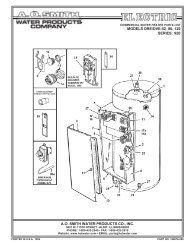Generic Single Flue 196293 002 1204.PMD
Generic Single Flue 196293 002 1204.PMD
Generic Single Flue 196293 002 1204.PMD
Create successful ePaper yourself
Turn your PDF publications into a flip-book with our unique Google optimized e-Paper software.
Because of the suddenness and amount of water, condensation watermay be diagnosed as a “tank leak”. After the water in the tank warms up(about 1-2 hours), the condition should disappear.Do not assume the water heater is leaking until there has been enoughtime for the water in the tank to warm up.An undersized water heater will cause more condensation. The waterheater must be sized properly to meet the family’s demands for hot waterincluding dishwashers, washing machines and shower heads.Excessive condensation may be noticed during the winter and earlyspring months when incoming water temperatures are at their lowest.Good venting is essential for a gas fired water heater to operate properlyas well as to carry away products of combustion and water vapor.SMOKE / ODORIt is not uncommon to experience a small amount of smoke and odorduring the initial start-up. This is due to burning off of oil from metal parts,and will disappear in a short while.THERMAL EXPANSIONOPERATIONAL CONDITIONSSMELLY WATERIn each water heater there is installed at least one anode rod (seeparts section) for corrosion protection of the tank. Certain waterconditions will cause a reaction between this rod and the water. Themost common complaint associated with the anode rod is one of a“rotten egg smell” in the hot water. This odor is derived from hydrogensulfide gas dissolved in the water. The smell is the result of fourfactors which must all be present for the odor to develop:a. A concentration of sulfate in the supply water.b. Little or no dissolved oxygen in the water.c. A sulfate reducing bacteria which has accumulated within the waterheater (this harmless bacteria is nontoxic to humans).d. An excess of active hydrogen in the tank. This is caused by thecorrosion protective action of the anode.Smelly water may be eliminated or reduced in some water heatermodels by replacing the anode(s) with one of less active material, andthen chlorinating the water heater tank and all hot water lines. Contactthe local water heater supplier or service agency for further informationconcerning an Anode Replacement Kit and this chlorination treatment.If the smelly water persists after the anode replacement and chlorinationtreatment, we can only suggest that chlorination or aeration of thewater supply be considered to eliminate the water problem.Do not remove the anode leaving the tank unprotected. Bydoing so, all warranty on the water heater tank is voided.“AIR” IN HOT WATER FAUCETSWater supply systems may, because of such events as high linepressure, frequent cut-offs, the effects of water hammer amongothers, have installed devices such as pressure reducing valves, checkvalves, back flow preventers, etc. to control these types of problems.When these devices are not equipped with an internal by-pass, and noother measures are taken, the devices cause the water system to beclosed. As water is heated, it expands (thermal expansion) and closedsystems do not allow for the expansion of heated water.The water within the water heater tank expands as it is heated andincreases the pressure of the water system. If the relieving point ofthe water heater’s temperature-pressure relief valve is reached, thevalve will relieve the excess pressure. The temperature-pressurerelief valve is not intended for the constant relief of thermalexpansion. This is an unacceptable condition and must be corrected.It is recommended that any devices installed which could create aclosed system have a by-pass and/or the system have an expansiontank or device to relieve the pressure built by thermal expansion in thewater system. Expansion tanks are available for ordering through alocal plumbing contractor. Contact the local water heater supplier orservice agency for assistance in controlling these situations.STRANGE SOUNDSPossible noises due to expansion and contraction of some metal partsduring periods of heat-up and cool-down do not necessarily representharmful or dangerous conditions.Condensation causes sizzling and popping within the burner area duringheating and cooling periods and should be considered normal. See“Condensation” in this section.18HYDROGEN GAS: Hydrogen gas can be produced in a hot watersystem that has not been used for a long period of time (generally twoweeks or more). Hydrogen gas is extremely flammable and explosive.To prevent the possibility of injury under these conditions, werecommend the hot water faucet, located farthest away, be openedfor several minutes before any electrical appliances which areconnected to the hot water system are used (such as a dishwasher orwashing machine). If hydrogen gas is present, there will probably bean unusual sound similar to air escaping through the pipe as the hotwater faucet is opened. There must be no smoking or open flame nearthe faucet at the time it is open.HIGH WATER TEMPERATURE SHUT OFF SYSTEMThis water heater is equipped with an automatic gas Shut-off system.This system works when high water temperatures are present. Thehigh temperature Shut-off is built into the gas control valve. It is nonresettable.If the high temperature Shut-off activates, the gas controlvalve must be replaced. Contact your gas supplier or service agency.Turn “OFF” the entire gas supply to the water heater.


